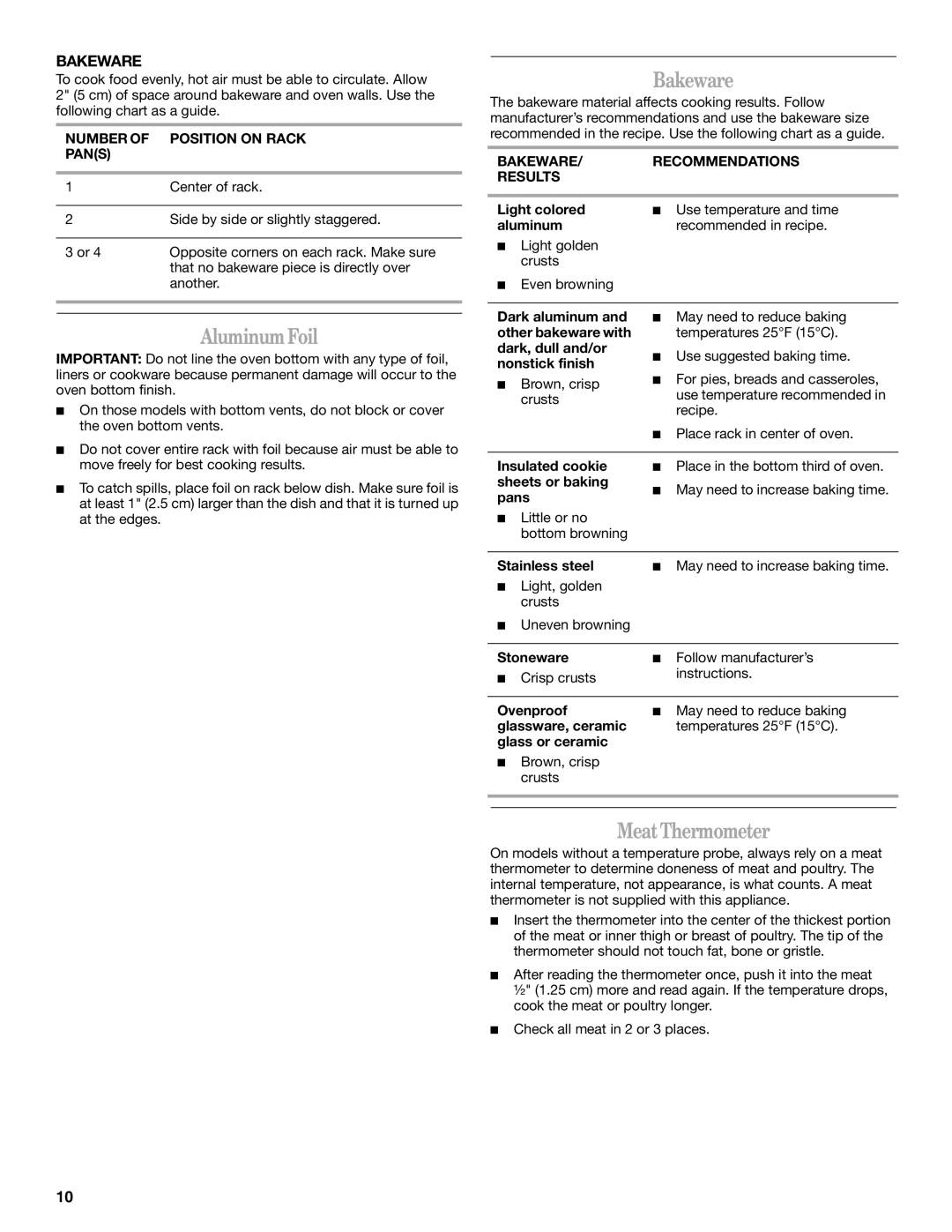
BAKEWARE
To cook food evenly, hot air must be able to circulate. Allow 2" (5 cm) of space around bakeware and oven walls. Use the following chart as a guide.
NUMBER OF POSITION ON RACK
PAN(S)
1Center of rack.
2Side by side or slightly staggered.
3 or 4 | Opposite corners on each rack. Make sure |
| that no bakeware piece is directly over |
| another. |
Bakeware
The bakeware material affects cooking results. Follow manufacturer’s recommendations and use the bakeware size recommended in the recipe. Use the following chart as a guide.
BAKEWARE/ | RECOMMENDATIONS |
RESULTS |
|
|
|
Light colored | ■ Use temperature and time |
aluminum | recommended in recipe. |
■Light golden crusts
■Even browning
Aluminum Foil
IMPORTANT: Do not line the oven bottom with any type of foil, liners or cookware because permanent damage will occur to the oven bottom finish.
■ | On those models with bottom vents, do not block or cover |
| the oven bottom vents. |
■ | Do not cover entire rack with foil because air must be able to |
Dark aluminum and other bakeware with dark, dull and/or nonstick finish
■Brown, crisp crusts
■May need to reduce baking temperatures 25°F (15°C).
■Use suggested baking time.
■For pies, breads and casseroles, use temperature recommended in recipe.
■Place rack in center of oven.
move freely for best cooking results. |
■ To catch spills, place foil on rack below dish. Make sure foil is |
at least 1" (2.5 cm) larger than the dish and that it is turned up |
at the edges. |
Insulated cookie | ■ | Place in the bottom third of oven. | |
sheets or baking | ■ | May need to increase baking time. | |
pans | |||
|
|
■Little or no bottom browning
Stainless steel | ■ May need to increase baking time. |
■Light, golden crusts
■Uneven browning
| Stoneware | ■ Follow manufacturer’s | ||
| ■ | Crisp crusts | instructions. | |
|
|
| ||
|
|
|
| |
| Ovenproof | ■ May need to reduce baking | ||
| glassware, ceramic | temperatures 25°F (15°C). | ||
| glass or ceramic |
|
| |
| ■ | Brown, crisp |
|
|
|
| crusts |
|
|
|
|
|
|
|
|
|
|
|
|
Meat Thermometer
On models without a temperature probe, always rely on a meat thermometer to determine doneness of meat and poultry. The internal temperature, not appearance, is what counts. A meat thermometer is not supplied with this appliance.
■Insert the thermometer into the center of the thickest portion of the meat or inner thigh or breast of poultry. The tip of the thermometer should not touch fat, bone or gristle.
■After reading the thermometer once, push it into the meat ½" (1.25 cm) more and read again. If the temperature drops, cook the meat or poultry longer.
■Check all meat in 2 or 3 places.
10
